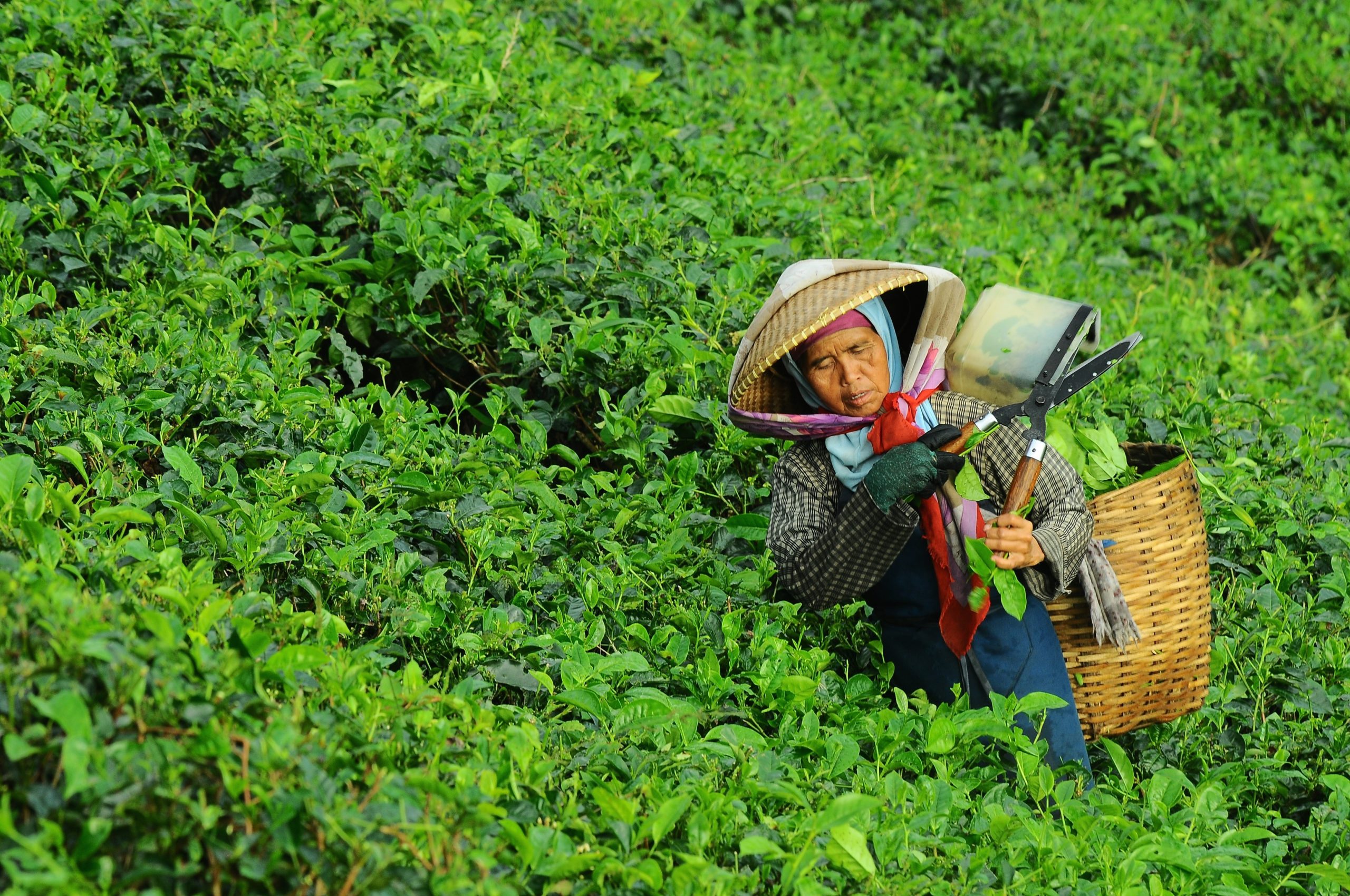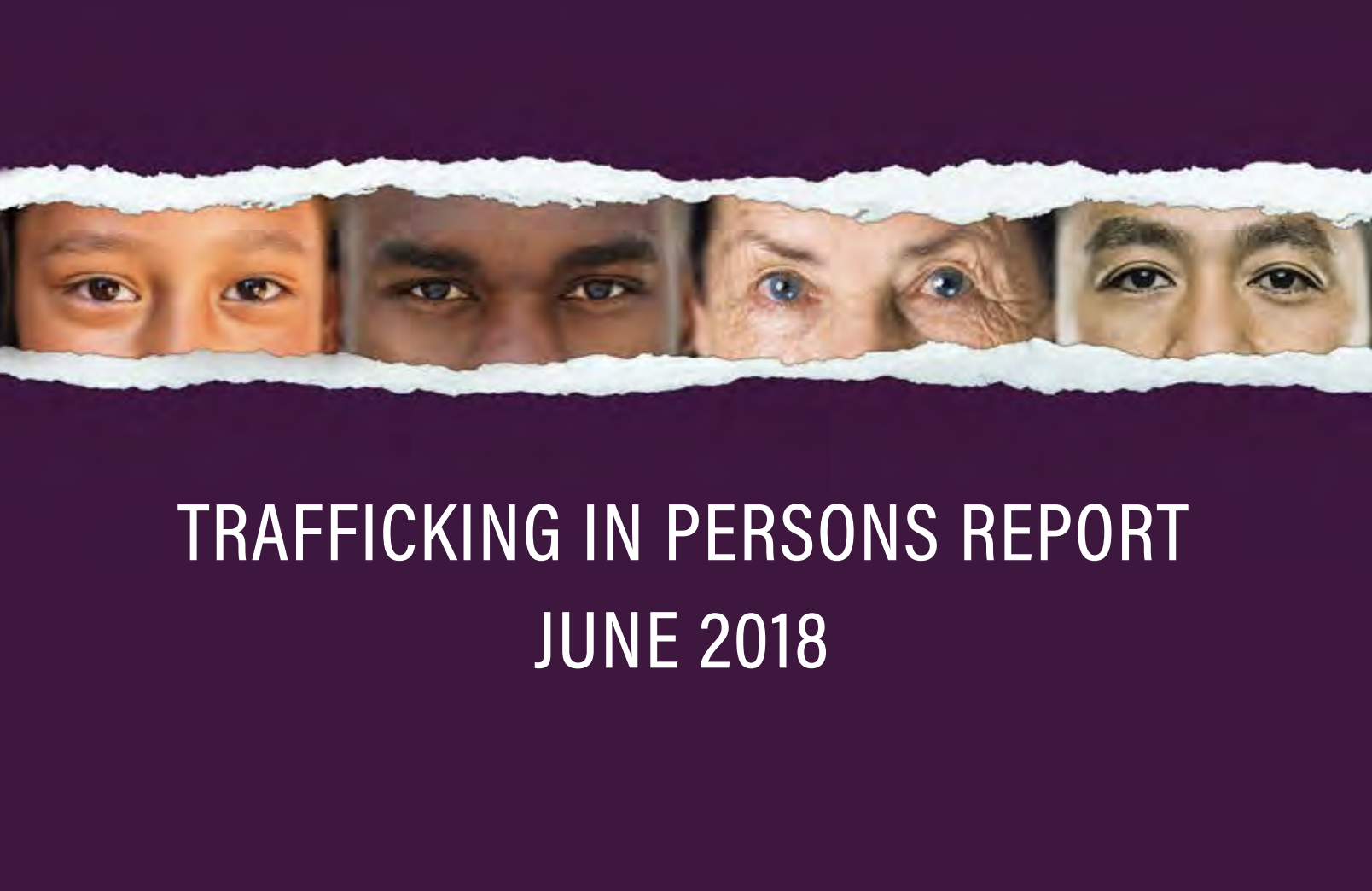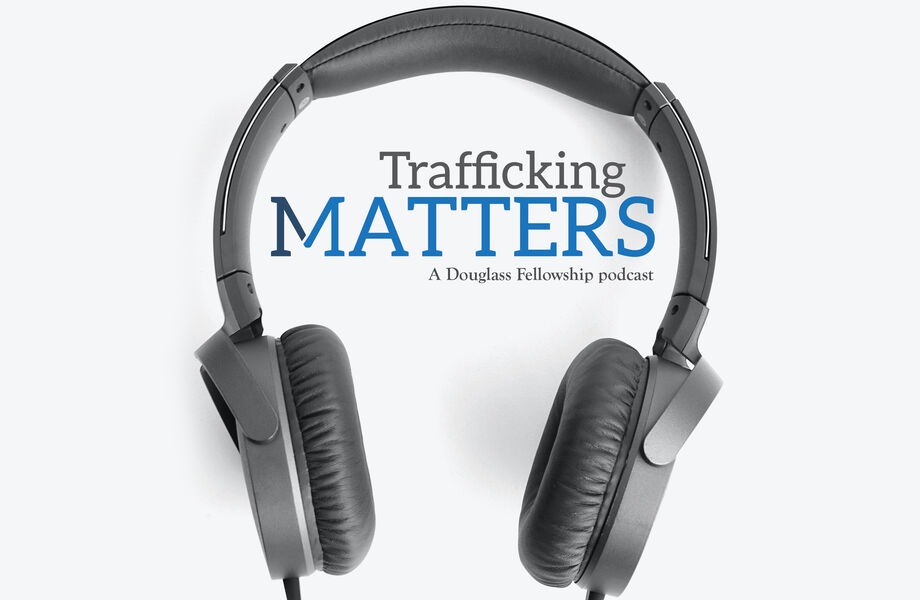The annual Trafficking in Persons (TIP) Report issued by the U.S. Department of State underscores that no country is free of modern slavery. Even the Tier 1 countries that are making significant efforts and inroads to address TIP must continue their efforts because the problem isn’t going away.
States must take ownership
Twenty years ago, anti-trafficking in persons (ATIP) action was still in its infancy. It was largely spearheaded at the international level through the pioneering efforts of the United Nations (UN) and international organizations (IOs), such as the International Organization for Migration (IOM), which often led work at the national level. Although slow at the uptake, the real work and the primary responsibility to implement ATIP efforts and initiatives lie with nation states. The adoption of a key international instrument on TIP – the UN Palermo Protocol1 – in 2000 was a breakthrough. Then, in 2001, the U.S. Department of State issued their first TIP Report. These tools gave practitioners around the world important legal norms, framework guidance, case studies, and data for making and measuring progress on ATIP efforts. Consequently, governments were empowered to take ownership in this effort by transposing international instruments into national laws and policies and establishing anti-trafficking mechanisms to coordinate activities among state agencies and non-governmental organizations (NGOs).
However, the true indicator of political will and success related to ATIP is the allocation of adequate financial and human resources for the actual implementation of laws and policies, the level of ownership by agencies, and the degree of coordination amongst all relevant actors. In this connection, beyond government agencies, the range of actors and partners depend on the forms of trafficking and the makeup of the countries and communities involved; a non-exhaustive list includes NGOs, community and faith-based organizations, indigenous and survivor groups, mental health workers, hospitals, schools, parent-teacher associations, youth centers, foster programs, labor inspectors, trade unions, migrant rights, media, and the private sector, including banks.
Local efforts are key to success
The focus of this year’s TIP Report is on Local Solutions to a Global Problem: Supporting Communities in the Fight against Human Trafficking. While laws and policies create the framework for our anti-trafficking efforts, coordination is critical for implementation.
The local level response is where the rubber meets the road, but it is where cases are still less often detected because they are “hidden in plain sight.” The local level is where victims are exploited, where citizens and local authorities are most likely to come into contact with persons involved in trafficking, and where the identification of both the perpetrator and the victim take place. The local level is where the vital day-to-day work of service providers, NGOs, police, and municipal authorities occur to prevent and respond to both transnational and domestic cases of human trafficking.
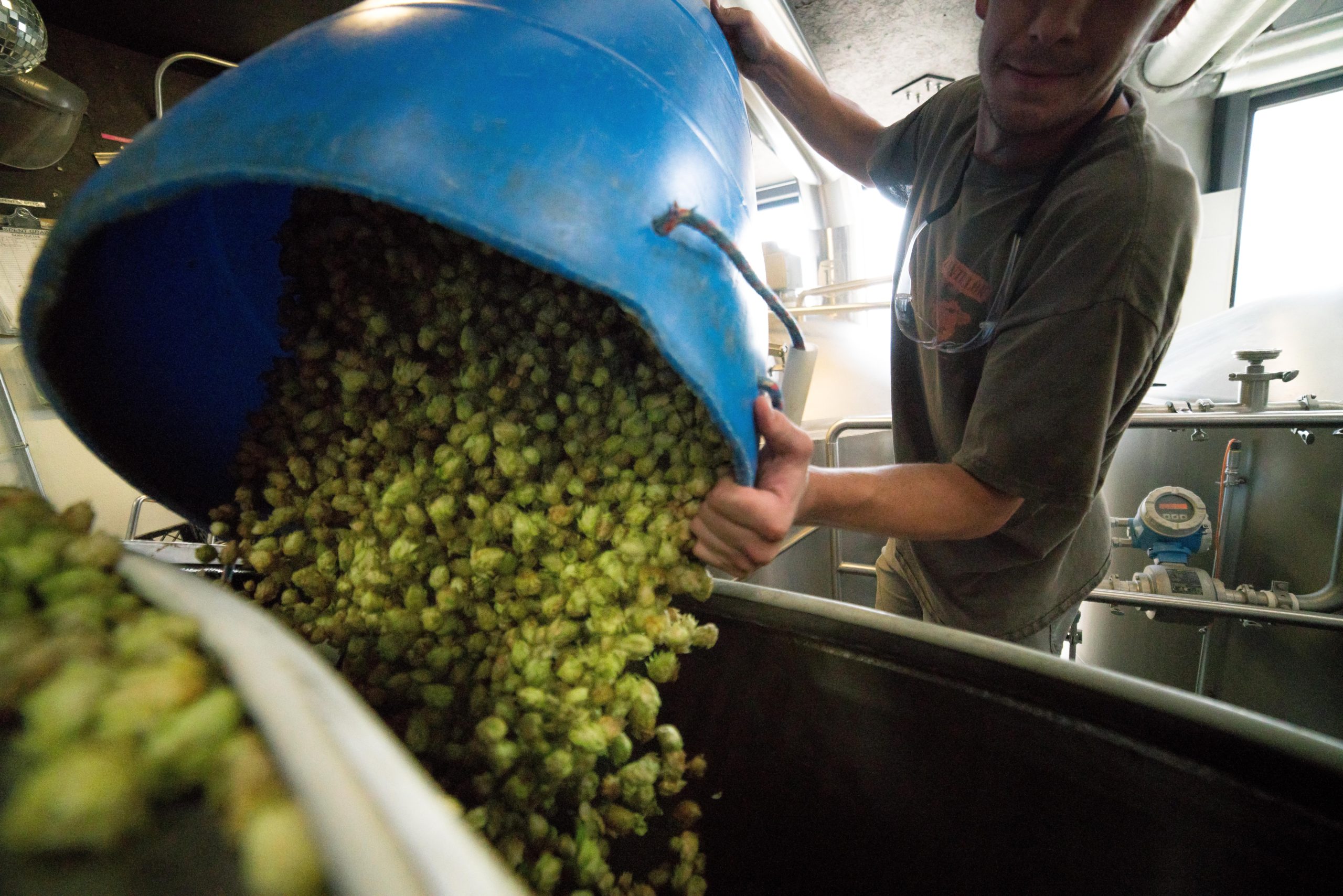
Therefore, much can and must be done at the local level. Local-level actors and community leaders understand their own needs best including what actions and interventions are needed and are possible both to prevent people from becoming trafficked and for victim reintegration.
For practitioners, the TIP Report is an excellent tool as it offers several good practices including task forces at the local level. Municipal-level task forces are often set up with financial and capacity building support from the national level in response to specific incidents, such as a large number of victims exploited on one farm or construction site or a child trafficking or domestic servitude case. They are likely structured to address community concerns and needs. Though task forces are adapted to local dynamics, and thus vary, those which are most effective in ATIP engage and are inclusive of non-government partners.
The Los Angles Task Force2 is the largest in the United States and is formed of representatives from government agencies and local NGOs. In the United Kingdom, Pan-London Trafficking Forum is a partner-led initiative that coordinates and supports activities to drive down modern slavery, including special ATIP envoys appointed by the London Mayor.3 For ambitious countries, the goal should be to set up task forces throughout the country. An example of this model is the Territorial Multi-disciplinary Teams4 established in all districts of Moldova.
Specific cases and local heroes inspire cooperation
Another useful dimension of the TIP reports has been the acknowledgment of TIP heroes who inspire practitioners to keep going. In the course of addressing a concrete TIP case, many times cooperation often improves when local actors can better relate to the specifics of a case at hand. When a case is more visible to the public, there is more pressure to resolve it. The publication of TIP cases has also helped local law enforcement officials realize the importance and value of cooperating with NGOs and other actors. This has led to a more effective criminal justice response, a better understanding of trends and changes in the forms of trafficking, enhancing the detection of trafficking crimes, bringing more perpetrators to justice, and appropriately protecting and restoring survivors.
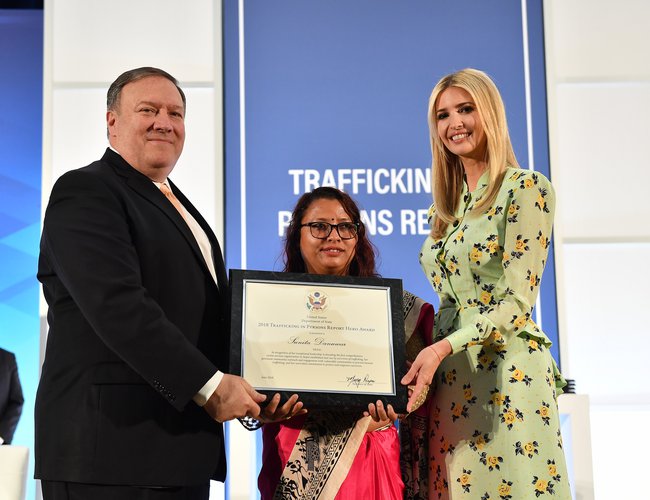
US Secretary of State Michael R. Pompeo honored Sunita Danuwar from Nepal as a Trafficking in Persons (TIP) Hero 2018.
Collaboration in practice creates something bigger than the sum of the efforts of each actor working alone. A priest in Cyprus who, after the tragic death of a trafficking victim who fell from her apartment while attempting to flee her traffickers, turned his cell phone into a hotline and the premises of his Russian Orthodox church, into a shelter for victims who had no place to turn. This priest galvanized attention and engaged both local and international actors on the issue and supported the victim’s father to take the case to the European Court of Human Rights, which led to a landmark judgment on the State’s obligations to prevent and protect people from human trafficking.5 Other TIP heroes whose work can be witnessed include a descendant of the famous abolitionist who is working with educators through the Frederick Douglass Family Initiatives6, a former mayor in Virginia who created the multi-industry multi-stakeholder Responsible Labor Initiative7, those working at the Council of Baltic Sea States8, which has strengthened the capacity and role of municipalities in work against TIP in its region, and Peace Corps volunteers who have identified and assisted victims and vulnerable populations around the world.
The power of political engagement and public outreach
Political engagement is half the battle for ATIP efforts. The other half is prevention, action, and support. It is vital, whatever local efforts are, to plug into leadership, to harness the power of working together with all relevant actors, including the wider public and media. Too often NGOs and service providers working on the ground do not see the forest for the trees. Many times cases need to be made public to mobilize action, especially in connecting the local to the national agenda. In the United States, ATIP benefits from bi-partisan political support and has been high on the national-level agenda. This is evidenced by the creation of the national inter-agency ‘task force’ called the Senior Policy Operating Group, responsible for coordinating U.S. government-wide ATIP efforts, chaired by the U.S. Department of State, and with the high-level position of an Ambassador-at-Large to Monitor and Combat Trafficking in Persons. The number of task forces in the United States and elsewhere continues to grow as well as local and national outreach campaigns, notably the U.S. Department of Homeland Security’s Blue Campaign9, a collaboration among U.S. government agencies, law enforcement, NGOs and private organizations.
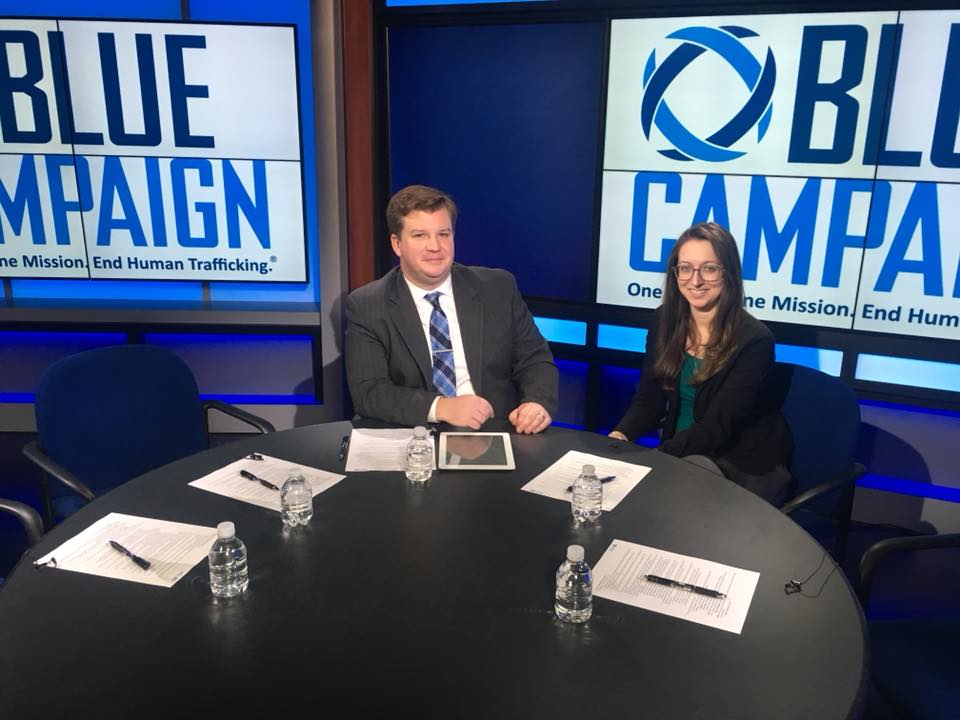
Department of Homeland Security’s Blue Campaign via Facebook
We have also seen leveraging political engagement and outreach in other places where inroads have been made. At the national level, governments have set up special authorities, such as the Gangmasters Labour Abuse Authority10 in the United Kingdom in response to a tragedy and farm workers, students, local communities have reached out to the private sector to come together in effective Worker Driven Social Responsibility11 initiatives. At the international level, there are multi-stakeholder responses such as the Responsible and Ethical Private Sector Coalition (RESPECT)12. IOs work together to provide support on transnational cases from joint pressure on a government to investigate a case and participate in mutual legal assistance to removing a stateless victim who was detained in an airport to assisting victims with pro-bono legal aid and even taking a case to international courts.
Finally, it is important to listen to and involve survivors. An example of this is Ontario Canada’s Provincial Anti-Human Trafficking Coordination Office13, which collaborates across more than 10 federal agencies and engages with hundreds of partners, including survivors and the U.S. Advisory Council on Human Trafficking14 comprised of individuals who have been subjected to trafficking. (This Council makes recommendations on federal ATIP policies to the President’s Interagency Task Force to Monitor and Combat Trafficking in Persons.) As the report notes, in involving survivors, it is vital to recognize their expertise and compensate them for their time.
Leveraging international cooperation & partnerships
The 2018 TIP Report’s section on Multilateral Efforts to Combat Human Trafficking Through Global and Regional Engagement provides an update on the next generation of UN efforts, following the norm-setting Palermo Protocol of 2000, the ILO Protocol of 2014, the Forced Labour Convention, and the 2017 Political Declaration to assess progress and challenges for both States and IOs at the global, regional and national levels in the implementation of the UN Global Plan of Action to Combat Trafficking in Persons. The declaration also called for strengthening the capacity of the United Nations Office on Drugs and Crime (UNODC) to connect and harmonize anti-trafficking efforts across the UN, including through the Interagency Coordination Group against Trafficking in Persons (ICAT)15. The UN Sustainable Development Goals for the first time include three targets on TIP – 5.2, 8.7 and 16.2 – around which there are partnerships, including Alliance 8.716, the 5.2 Global Partnership17, and the Global Partnership to End Violence Against Children18 regarding target 16.2. At the regional level, promising practices include the Bali Process Government and Business Forum19 and the OSCE Alliance against Trafficking in Persons.20
In addition to the UN legal norms and reports, the TIP report is a key reference document for understanding international implementation on TIP. The global law enforcement data about prosecutions, convictions, and identified victims help practitioners understand changes and progress from year to year. The TIP report includes a chart, showing the countries that have ratified, acceded to, or accepted international conventions;21 as well as updates on the relevant frameworks of international, regional, and sub-regional organizations combating human trafficking. On a hopeful note, trends in the multi-lateral section are reassuring as they are generally going in a positive direction, though much more remains to be done.
The TIP report also includes a section on stopping human trafficking, sexual exploitation, and abuse by international peacekeepers and civilian personnel. This is vital as trafficking thrives on the chaos created by conflict and population displacement. This section is also timely, in light of the United Nations Security Council (UNSC) resolutions on Trafficking in Persons in Conflict (2331) in 2016 and resolution 2388 in 2017. These emphasized, inter alia, the importance of international cooperation in law enforcement, strong partnerships with the private sector and civil society, how peacekeeping and political missions can support the efforts of host states in combating human trafficking, and the UNSC’s intention to integrate an anti-trafficking component into the work of the UNSC’s relevant Sanctions Committees to ensure perpetrators are held accountable.

Members of the United Nations Security Council sit during a meeting. (Shannon Stapleton/Reuters)
Measuring accountability amongst states
The TIP Report has faced some criticism over whether its rankings are truly unbiased. On the positive side, the Report’s comparative analysis can be seen as a way to put a gentle “peer group pressure” on states to do even better and to learn from each other. Ultimately, the TIP Report monitors and spotlights the accountability of the State, which has the primary responsibility to uphold justice, guarantee appropriate services for all trafficked persons, and ensure that its own supply chains are free from modern slavery through regulating public procurement. States are also accountable for ensuring that TIP is integrated across agencies and mainstreamed into all appropriate policy areas.
More evidence-based knowledge is needed to continue the positive trend of more investments by countries, municipalities, IOs, NGOs, and the private sector in monitoring and evaluation, in baseline assessments of the risks and the scale of the problem, on data collection, sharing, and reporting, which will pay future dividends.
The TIP Report shows the real-life face of modern slavery. It offers hope that all possible actors – at each level – can make a difference from global to local and from State to individual, if each of us acknowledges that slavery still exists, it can happen anywhere to anyone, and the responsibility is in each of our hands to do our part in preventing TIP in the first place. We need to empower and ensure dignity and freedom for those vulnerable and enslaved and to bring traffickers to justice. As Confucius once said, “the ‘person’ who moves a mountain begins by carrying away small stones.”
“Do a little bit of good where you are. It is those little bits of good put together that overwhelm the world.” – Rev. Desmond Tutu
- 1 The Protocol to Prevent, Suppress and Punish Trafficking in Persons, Especially Women and Children, supplementing the United Nations Convention against Transnational Organized Crime http://www.unodc.org/documents/treaties/UNTOC/Publications/TOC%20Convention/TOCebook-e.pdf
- 2 http://lahumantrafficking.com/about-us/
- 3 https://www.london.gov.uk/press-releases/mayoral/mayor-appoints-special-envoys
- 4 https://antitrafic.gov.md/public/files/Mold_Lex.doc
- 5 http://echrblog.blogspot.com/2010/01/landmark-judgment-on-human-trafficking.html
- 6 http://www.fdfi.org
- 7 http://www.responsiblebusiness.org/initiatives/rli/
- 8 http://www.cbss.org/wp-content/uploads/2016/03/Guidelines-for-Municipalities-ENG.pdf
- 9 https://www.dhs.gov/bluecampaign/about-blue-campaign
- 10 http://www.gla.gov.uk/who-we-are/our-aims-and-objectives/the-gangmasters-and-labour-abuse-authority/
- 11 https://wsr-network.org
- 12 http://globalinitiative.net/initiatives/respect/
- 13 https://www.mcss.gov.on.ca/en/mcss/programs/humantrafficking/firstYearProgress.aspx
- 14 https://www.state.gov/j/tip/c73433.htm
- 15 http://icat.network
- 16 https://www.alliance87.org
- 17 http://www.catwinternational.org/Content/Images/Article/710/attachment.pdf
- 18 http://www.end-violence.org
- 19 https://www.baliprocess.net/bali-process-government-and-business-forum/
- 20 https://www.osce.org/secretariat/107221
- 21 A complete list that includes all of the countries covered by the 2018 Trafficking in Persons Report is available at: https://www.state.gov/j/tip/conventions/index.htm

